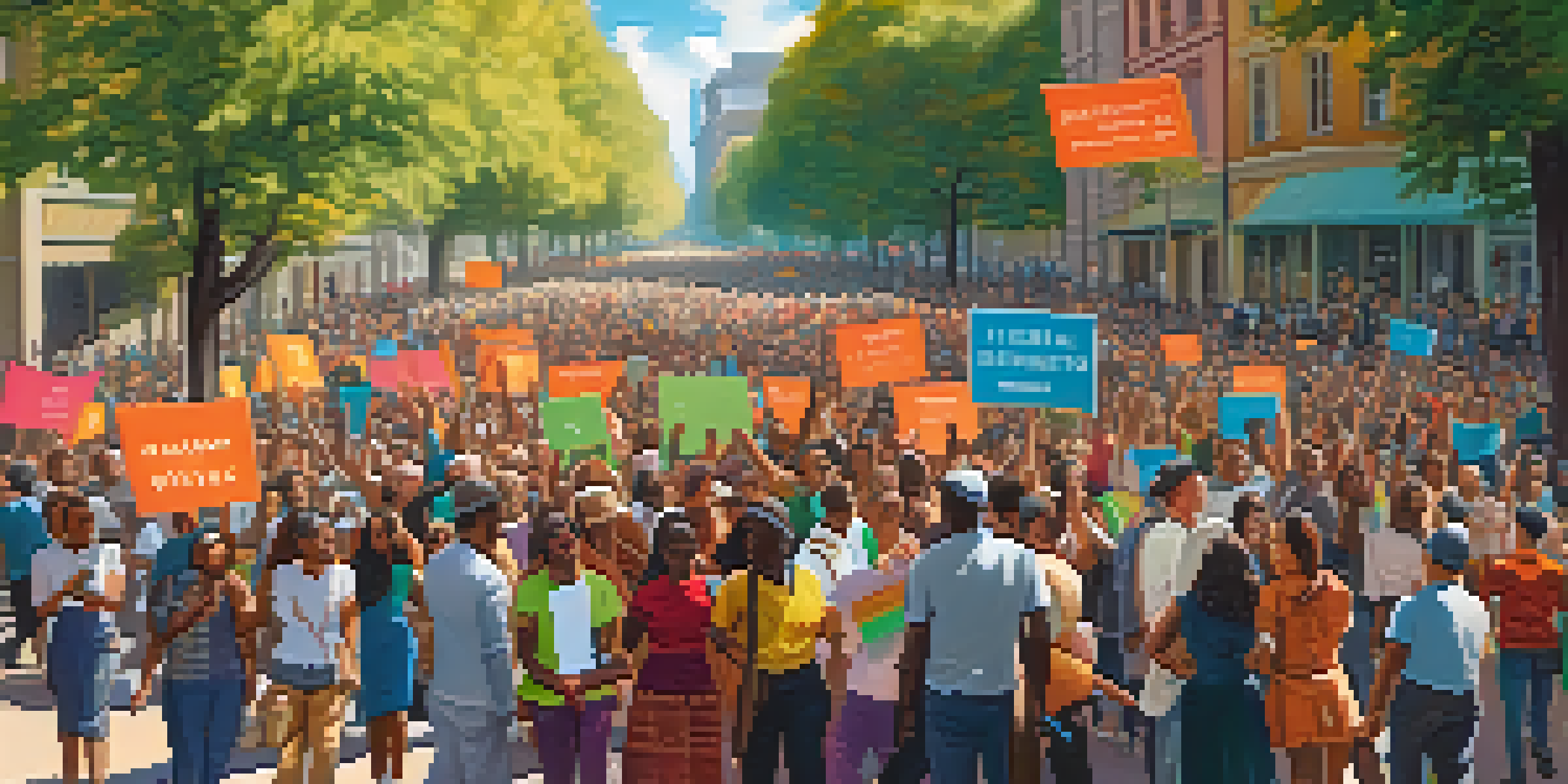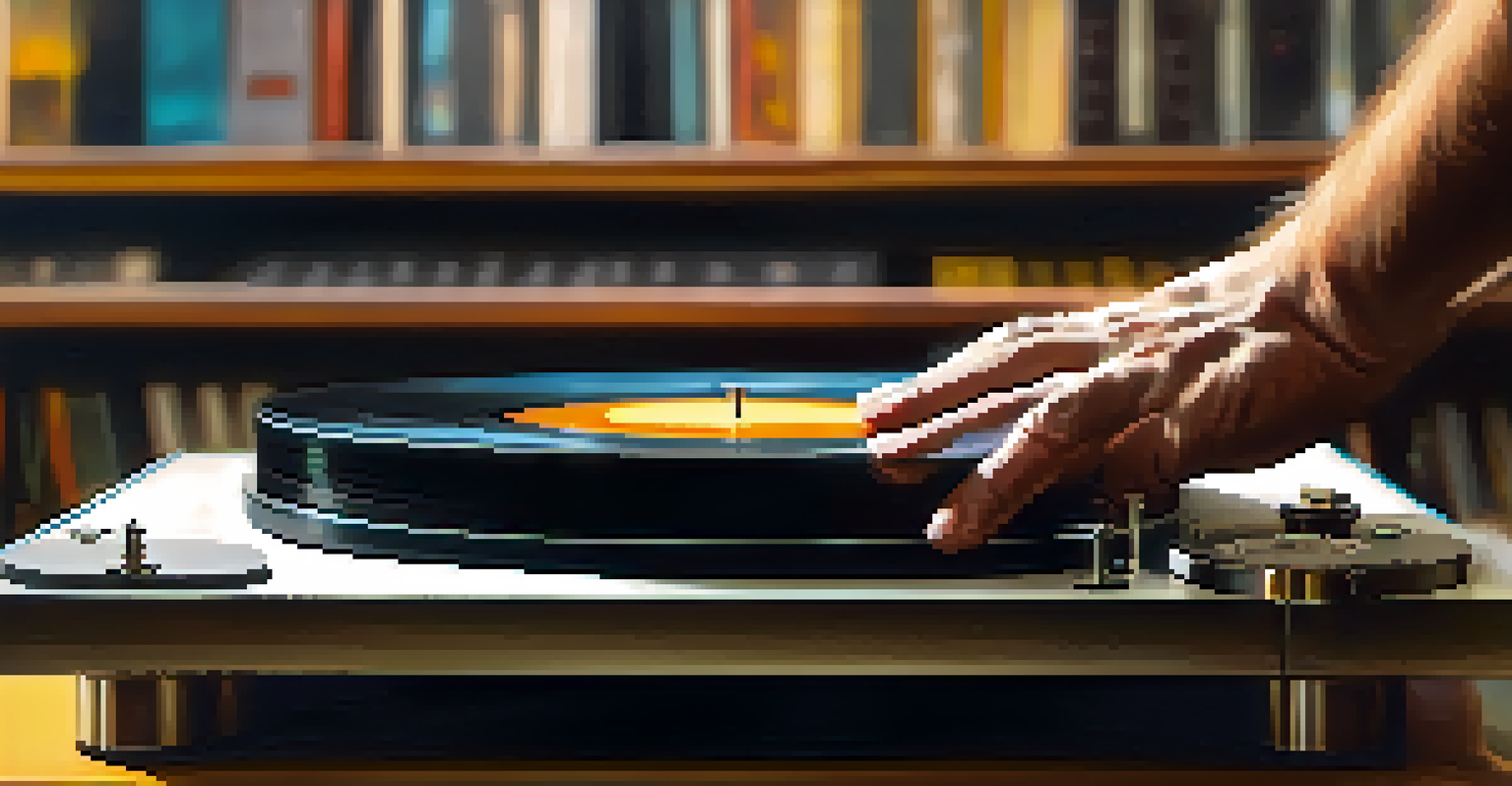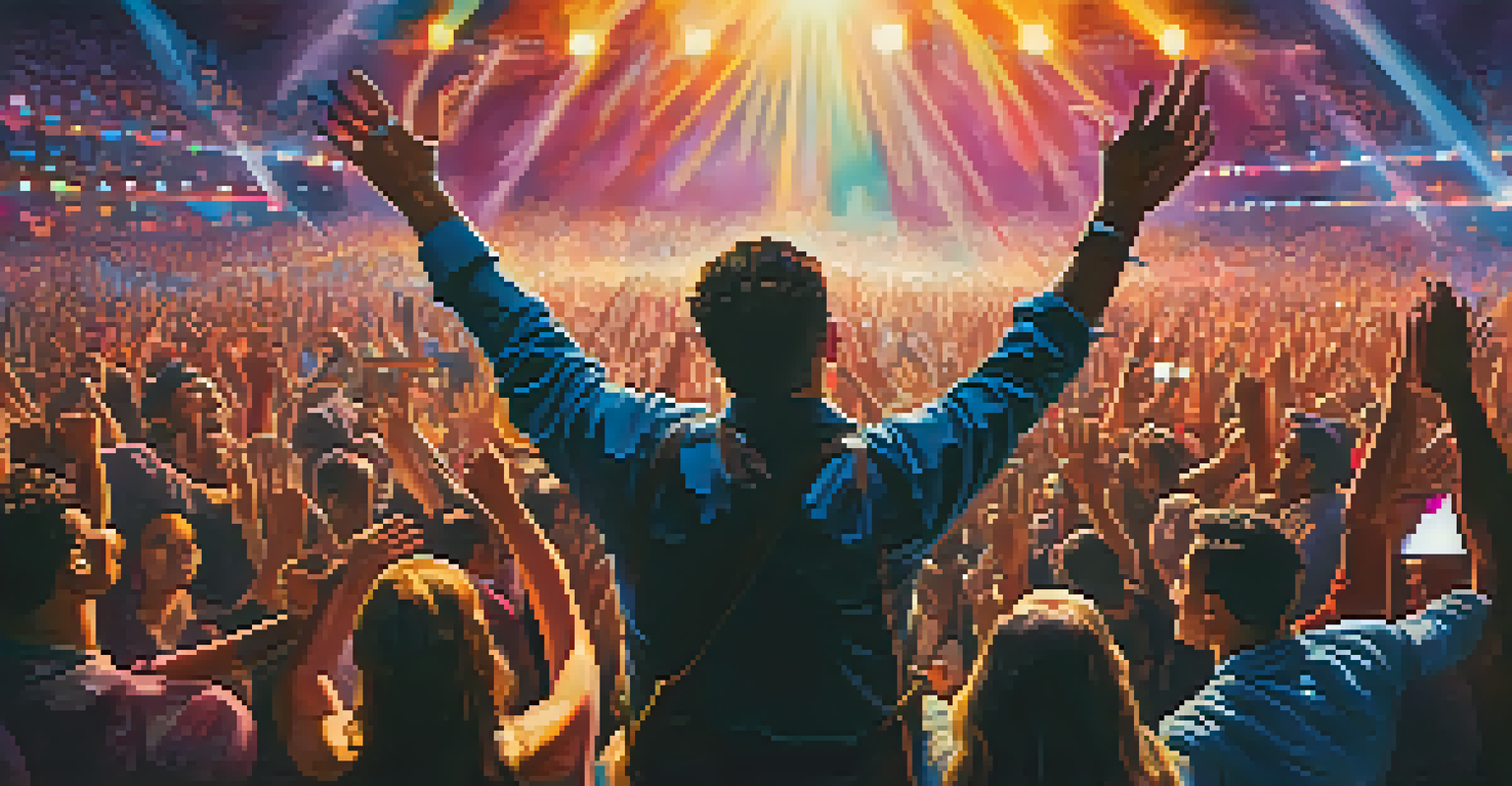Music and Politics: The Voice of Generations Through Time

The Historical Bond Between Music and Politics
From protest songs during the Civil Rights Movement to anthems of change during the Vietnam War, music has always resonated with political sentiments. Artists like Bob Dylan and Joan Baez used their music to echo the frustrations and hopes of their generations. This connection has helped forge a collective identity, enabling people to unite under shared beliefs and aspirations, often leading to social change.
Music is the weapon of the future.
Music serves as a powerful vehicle for expressing dissent and advocating for justice. By capturing the essence of a moment, songs often transcend time and space, creating a soundtrack for movements. For instance, the iconic 'We Shall Overcome' became synonymous with the struggle for civil rights, embodying the spirit of resilience and hope.
As we look back through history, it becomes evident that music is not just entertainment; it’s a reflection of the political landscape. This dynamic relationship continues to evolve, illustrating how artists use their platforms to influence and inspire future generations.
Songs of the Civil Rights Movement
The Civil Rights Movement of the 1960s was marked by powerful music that highlighted the struggles faced by African Americans. Songs like 'A Change Is Gonna Come' by Sam Cooke provided hope and motivation during a challenging time. These anthems not only uplifted spirits but also galvanized support for the movement, resonating with both activists and everyday citizens.

In addition to providing comfort, these songs acted as rallying cries, bringing people together for marches and protests. The rhythm and lyrics became anthems of unity, allowing individuals to express their desires for equality and justice. This musical backdrop helped to create a shared experience, one that reinforced the message of the movement and inspired action.
Music as a Tool for Political Change
Throughout history, music has served as a powerful vehicle for expressing dissent and advocating for social justice.
Looking back, it's clear that the music of the Civil Rights Movement played a pivotal role in shaping public opinion and policy. It reminded people of the power of collective voices, echoing the sentiment that change is possible through solidarity.
Protest Music in the 1960s and 70s
The 1960s and 70s birthed a wave of protest music that addressed issues like war, inequality, and civil rights. Artists like Creedence Clearwater Revival and Buffalo Springfield created songs that captured the disillusionment of a generation. Tracks like 'Fortunate Son' served as critiques of the Vietnam War, voicing the frustrations of those who felt marginalized by political decisions.
The power of the people is greater than the people in power.
This era of music not only reflected the sentiments of the youth but also influenced public discourse. The lyrics became a form of journalism, shedding light on injustices and encouraging listeners to engage in political activism. The melodies and messages resonated deeply, making them memorable parts of the cultural landscape.
As we listen to these songs today, we are reminded of their enduring impact on both music and politics. They serve as a testament to the idea that art can inspire change and foster a sense of community among those who seek a better world.
Hip-Hop: The Voice of a New Generation
Emerging in the late 20th century, hip-hop became the soundtrack for a new generation, addressing issues from police brutality to systemic inequality. Artists like Tupac Shakur and Nas used their lyrics to tell stories of struggle and resilience, making their music a potent tool for political expression. This genre not only entertains but also educates, shedding light on social issues often overlooked.
The rise of hip-hop has also given a voice to marginalized communities, allowing them to share their experiences and perspectives. With tracks like 'Fight the Power' by Public Enemy, hip-hop has served as a rallying cry for activism, encouraging listeners to challenge the status quo. The genre’s raw, unfiltered nature makes it relatable, drawing in audiences who may not have previously engaged with political discourse.
Impact of Protest Songs
Protest songs from the Civil Rights Movement to modern times have united people and galvanized support for various causes.
Today, hip-hop continues to evolve, with artists like Kendrick Lamar and J. Cole addressing contemporary issues while inspiring political engagement. The genre's ability to connect with younger audiences ensures that the conversation around music and politics remains vibrant and relevant.
Modern Pop and Political Messaging
In recent years, mainstream pop music has increasingly embraced political themes, with artists using their platforms to advocate for change. Hits by Taylor Swift and Lady Gaga address issues like LGBTQ+ rights and social justice, showcasing how pop has become a vehicle for activism. This trend illustrates that political engagement is not limited to specific genres; it can be woven into the fabric of popular culture.
These artists often leverage their visibility to spark discussions around crucial societal issues, encouraging fans to take action. For example, Swift’s 'You Need to Calm Down' promotes acceptance and equality, resonating with a broad audience. By combining catchy melodies with powerful messages, pop music has the potential to reach and influence a wide demographic.
As listeners engage with these songs, they are often inspired to reflect on their own beliefs and actions. The growing trend of political messages in pop music highlights the genre's role in shaping social values and motivating individuals to advocate for change.
The Global Influence of Music on Politics
Music transcends borders, and its influence on politics is felt worldwide. From Fela Kuti's Afrobeat in Nigeria to the protest anthems in Latin America, artists across the globe have used music to address political issues. These diverse sounds and messages unite people, creating a shared understanding of struggles and aspirations.
In many cultures, music serves as a form of resistance against oppressive regimes. During the Arab Spring, for example, songs became powerful symbols of hope and defiance. Artists like Ahmed Fakroun and Rim Banna inspired protests and mobilized crowds, showcasing how music can harness collective energy for change.
Global Influence of Musical Activism
Across cultures, music transcends borders, uniting individuals in their struggles and aspirations while inspiring political action.
The global nature of music and its ability to resonate with various audiences make it an essential tool for political discourse. As we witness the interplay between music and politics on an international scale, it becomes clear that the power of song knows no boundaries.
The Future of Music and Political Activism
As we move forward, the relationship between music and politics is likely to become even more intertwined. With the rise of social media, artists can share their messages and mobilize supporters instantly. This instant access to audiences opens up new avenues for political engagement, allowing artists to respond to current events more rapidly.
Emerging genres and technologies, such as digital music, also offer new opportunities for activism. Artists can collaborate across borders and genres, creating a rich tapestry of sounds that amplify their shared messages. This evolution ensures that the political landscape will continue to be influenced by diverse musical expressions.

Ultimately, the future of music and political activism will depend on how artists harness their platforms to inspire change. Just as music has shaped history, it will undoubtedly continue to be a powerful catalyst for social transformation in the years to come.